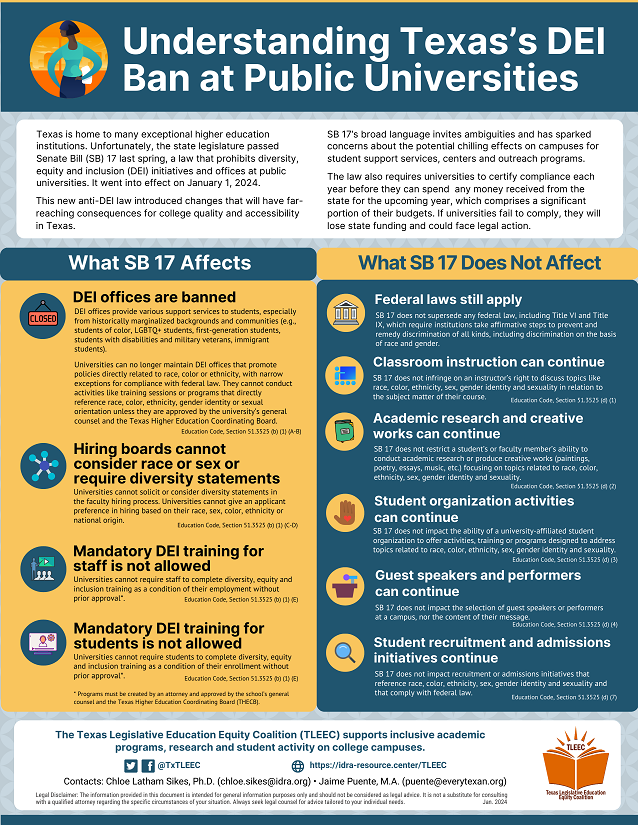• By Chloe Latham Sikes, Ph.D. • IDRA Newsletter • January 2024 •
The Texas legislature passed Senate Bill 17 last spring to ban diversity, equity and inclusion (DEI) offices in colleges and universities. This new anti-DEI law will have far-reaching consequences for college quality and accessibility in Texas. 
DEI offices and initiatives were established to help foster more equitable and inclusive college learning environments for historically marginalized students. They offer targeted resources and support for historically marginalized students, including Black and Latino students, students identifying as LGBTQ+, and students from low-income households, first-generation college students, students who are immigrants and military veterans.
The law took effect officially on January 1, 2024, though universities began reorganizing DEI offices, staff and related on-campus student support centers throughout last year.
Texas is one of at least eight states that passed similar bans last year to undermine diversity in higher education (Martínez-Alvarado & Perez, 2023). Dozens of other states have taken similar steps to ban or limit DEI offices by prohibiting or cutting state funding for them or incorporating restrictions on DEI in hiring and other institutional practices (Insight into Diversity, 2023; Walker, 2023).
Texas’ new law bans the establishment, maintenance and state funding for DEI offices at public colleges and universities. The ban extends to required training, such as those on implicit racial or gender bias, and the practice of requesting a diversity statement in hiring faculty and staff.
The law exempts certain practices related to race and gender inclusion from the DEI ban, including classroom instruction, research, student-sponsored campus organizations, and recruitment and admissions programs. However, broad interpretations of the law could extend to banning or limiting important college outreach, recruitment and admissions programs that specifically support historically marginalized students (Kemgang, 2023).
Texas is one of at least eight states that passed similar bans last year to censor diversity in higher education.
For example, at the University of Texas at Austin, the Multicultural Engagement Center (MEC) and Monarch Program have both been shut down this school year. The MEC housed multiple student organizations focused on advancing social change (Srivastava, 2024). The Monarch Program served undocumented students, regardless of race or gender (Orosco, 2024). Immigration and citizenship status are not referenced in SB 17.
At the University of Houston, a preemptive closure of the LGBTQ Resource Center in August 2023 rattled students and sowed doubt about recruiting future talented students and faculty who care about LGBTQ campus inclusion (Welch, 2023).
Already, students and faculty report vague understandings of how the exempted activities will be protected from the ban and concerns about the bill’s chilling effect on various equity-focused academic and student support initiatives (Culbertson, 2023).
Texas public colleges and universities enroll approximately 1.6 million students, 51% of whom are Black or Latino (NCES, 2021). The Texas Legislative Black Caucus and other state legislative groups representing Black, Latino and LGBTQ+ interests issued a statement on the law’s effective date expressing concern about the DEI ban’s impact on Texas students: “The absence of dedicated resources for DEI initiatives risks creating a void in addressing systemic inequalities and fostering an inclusive learning environment for all students” (TLBC, 2024).
The Texas Legislative Education Equity Coalition (TLEEC) advocated support for DEI offices during the legislative session and prepared a brief bilingual guide to SB 17 (see infographic).
Resources
Culberston, C. (October 16, 2023). Recent AAUP Study Shows Impact of New Legislation on Higher Education. North Texas Daily.
Insight into Diversity. (2024). The War on DEI, webpage.
Kemgang, S. (May 8, 2023). Prohibiting College DEI Programs Would Particularly Impact Marginalized K-12 Students – IDRA Testimony Against SB 17 submitted to the Texas House Higher Education Committee. IDRA.
Martínez-Alvarado, S., & Perez, S. (2023). A Map of Anti-DEI Efforts on College Campuses Across the U.S. The Education Trust.
NCES. (2021). Number of students enrolled in postsecondary institutions in the fall, by state and race/ethnicity: 2021. U.S. Department of Education. Institute of Education Sciences, National Center for Education Statistics.
Orosco, T. (January 24, 2024). Rooted Members Leave to Pick Up the Pieces after SB 17 Shuts Down Partnering Program, Monarch. The Daily Texan.
Srivastava, N. (Jan. 18, 2024). Multicultural Engagement Center Closes Because of SB 17. The Daily Texan.
TLBC. (January 1, 2024). Texans United for DEI Statement on Enactment of SB 17. Texas Legislative Black Caucus.
Walker, A. (December 14, 2023). Oklahoma governor signs order effectively banning diversity programs at public colleges. The Guardian.
Welch, M. (Aug. 24 2023). Texas’ Anti-DEI Law is Wreaking Havoc Before it Takes Effect Next Year, Here’s What to Know. Houston Landing.
Chloe Latham Sikes, Ph.D., is IDRA’s deputy director of policy. Comments and questions may be directed to her via e-mail at chloe.sikes@idra.org.
[©2024, IDRA. This article originally appeared in the January 2024 edition of the IDRA Newsletter by the Intercultural Development Research Association. Permission to reproduce this article is granted provided the article is reprinted in its entirety and proper credit is given to IDRA and the author.]


